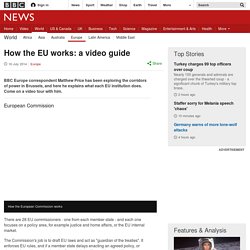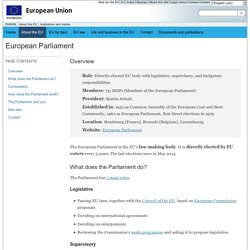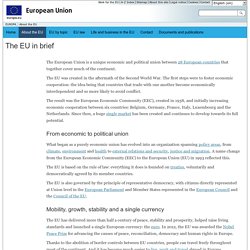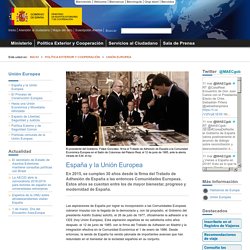

Positives and Negatives of EU (European Union) - Advantages and disadvantages table in A Level and IB Geography. NATO: What is it, why does it still exist, and how does it work? How the EU works: a video guide. BBC Europe correspondent Matthew Price has been exploring the corridors of power in Brussels, and here he explains what each EU institution does.

Come on a video tour with him. European Commission There are 28 EU commissioners - one from each member state - and each one focuses on a policy area, for example justice and home affairs, or the EU internal market. The Commission's job is to draft EU laws and act as "guardian of the treaties". It enforces EU rules, and if a member state delays enacting an agreed policy, or simply refuses to comply, then the Commission will warn them and if necessary pursue them at the EU Court of Justice. New EU laws, or revisions to existing ones, come about usually after requests from governments, Euro MPs or lobby groups.
The Commission has a staff of about 33,000. Council of Ministers Usually this institution is simply called "the Council". But for taxation or foreign policy issues, such as trade agreements or sanctions, unanimity is required. European Parliament. The European Parliament is the EU's law-making body.

It is directly elected by EU voters every 5 years. The last elections were in May 2014. What does the Parliament do? The Parliament has 3 main roles: The EU in brief. The European Union is a unique economic and political union between 28 European countries that together cover much of the continent.

The EU was created in the aftermath of the Second World War. The first steps were to foster economic cooperation: the idea being that countries that trade with one another become economically interdependent and so more likely to avoid conflict. The result was the European Economic Community (EEC), created in 1958, and initially increasing economic cooperation between six countries: Belgium, Germany, France, Italy, Luxembourg and the Netherlands.
Since then, a huge single market has been created and continues to develop towards its full potential. From economic to political union What began as a purely economic union has evolved into an organization spanning policy areas, from climate, environment and health to external relations and security, justice and migration. Elecciones europeas: Cinco cosas que la Unión Europea ha hecho por nosotros . Noticias de Mundo. Además de llenar Bruselas de burócratas, traducir toneladas de documentos a 24 idiomas, organizar elecciones, limitar la soberanía nacional y modificar leyes...

¿Qué ha hecho la Unión Europea por nosotros? ¿Cuáles son los programas y políticas que más impacto han tenido sobre nuestras vidasnbsp; 1. Sostener la Investigación y Desarrollo del Continente La revista británica NewScientist fue contundente esta semana sobre Nigel Farage, el líder del euroescéptico UKIP británico. Los proyectos científicos pagados por la UE requieren al menos de la participación de tres Estados diferentes y Bruselas es su principal apoyo al financiar, por ejemplo, con 660 millones de euros en 2013 los premios 'Advanced Grant' para los investigadores de mayor prestigio. La escocesa Anne Glover es la máxima responsable de este grupo y habla directamente con Barroso sobre la estrategia de los próximos seis años, cuando se distribuirán 65.000 millones de euros en I+D. 2. 3. 4. 5.
España y la Unión Europea. Las aspiraciones de España por lograr su incorporación a las Comunidades Europeas cobraron impulso con la llegada de la democracia y, con tal propósito, el Gobierno del presidente Adolfo Suárez solicitó, el 26 de julio de 1977, oficialmente la adhesión a la CEE (hoy Unión Europea).

Esta aspiración española se vio satisfecha ocho años después -el 12 de junio de 1985- con la firma del Tratado de Adhesión en Madrid y la integración efectiva en la Comunidad Económica el 1 de enero de 1986. What has the European Union ever done for us? Britain's turbulent relationship with the European Union is coming to an end, after the UK opted for Brexit in the EU referendum.

David Cameron is resigning after failing to convince the public - and his own MPs - that he gained significant ground in his attempts to renegotiate the terms of Britain’s EU membership. But although the UK and EU have had their ups and downs, there are a number of things the Union has done which some may feel could be worth holding on to. 1) It gives you freedom to live, work and retire anywhere in Europe As a member of the EU, UK citizens benefit from freedom of movement across the continent. Considered one of the so-called four pillars of the European Union, this freedom allows all EU citizens to live, work and travel in other member states.
A British person to has the right to stay in any other EU country providing they have a valid UK passport. 2) It sustains millions of jobs 3) Your holiday is much easier - and safer 6) Our businesses depend on it Reuse content. Brexit explained: what happens when the UK leaves the EU? NATO. United Nations.